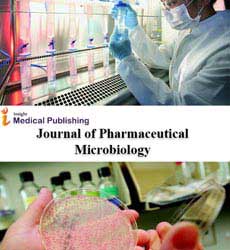Pharmaceutical Microbiology: An Applied Branch of Microbiology
Sarker SD
| Satyajit DS* Medicinal Chemistry and Natural Products Research Group, School of Pharmacy and Biomolecular Sciences, Faculty of Science, Liverpool John Moores University, United Kingdom |
| Corresponding Author: Satyajit DS, Medicinal Chemistry and Natural Products Research Group, School of Pharmacy and Biomolecular Sciences, Faculty of Science, Liverpool John Moores University, United Kingdom E-mail: S.Sarker@ljmu.ac.uk |
| Received: December 13, 2015 Accepted: December 15, 2015 Published: December 21, 2015 |
| Citation: Satyajit DS. Pharmaceutical Microbiology: An Applied Branch of Microbiology. J Pharm Microbiol. 2015, 1:1. doi: doi number |
| Related article at Pubmed, Scholar Google |
Visit for more related articles at Journal of Pharmaceutical Microbiology
| Simply, microbiology is the study of microorganisms, e.g., bacteria, fungus and viruses. When microbiological concepts, processes and techniques are applied to pharmaceutical operations, the subject is then called ‘pharmaceutical microbiology’. It can be defined as the study of microorganisms that are pertinent to the production of antibiotics, enzymes, vitamins, vaccines, and other pharmaceutical products; it also incorporates the study of microorganisms that cause pharmaceutical contaminations, and degradation, deterioration and spoil of pharmaceutical raw materials and finished products. |
| Generally, pharmaceutical microbiology provides knowledge and understanding with regards to the significance of the presence of bacteria, yeasts, moulds, viruses and toxins in pharmaceutical raw materials, intermediates, products and pharmaceutical production environments, as well as the microbiological control of pharmaceutical products, production environments and people. |
| One of the key objectives of pharmaceutical microbiology is to ensure safety and efficacy of pharmaceutical products. It embraces the processes like the validation of disinfectants, evaluation of the efficacy of disinfectants in suspension, on surfaces, and through field trials. Pharmaceutical microbiology offers protocols and techniques associated with the operation and assurance of clean-room, aseptic-room and controlled environments for preventing any possible microbial contamination, and introduces risk assessment and practical contamination control strategies. |
| Since the introduction of this applied subject area of microbiology, over the years, pharmaceutical microbiology has evolved and expanded significantly to encompass various other aspects, e.g., research and development of new anti-infective agents, the use of microorganisms to detect mutagenic and carcinogenic potential in drugs, and the use of microorganisms in the manufacture of insulin and human growth hormone. |
| As pharmaceutical microbiology is crucial to the manufacture and production of drugs, biologics and devices, it is absolutely important that people working in these industries have a strong understanding and in depth knowledge of pharmaceutical microbiological principles, techniques, processes and strategies in order to avoid any potentially costly and life-threatening failures and consequences. Traditionally, in pharmacy and pharmaceutical sciences curricula, pharmaceutical microbiology is taught at various lengths and depths. Also, in many microbiology curricula, often pharmaceutical microbiology along with medical microbiology is taught. Pharmaceutical microbiology will continue to provide evidence-based and scientifically-proven approaches and procedures to ensure sterility, determine antimicrobial effectiveness, microbial contamination or bioburden, or to analyze endotoxins. With the emergence of ‘super bugs’ or ‘multiple drug resistant strains’ of pathogenic microorganisms, the role of pharmaceutical microbiology has become even more significant and relevant to quality healthcare provisions, and must be taught in great lengths, especially in healthcare and medicine related curricula world-wide. |
| People trained in pharmaceutical microbiology, often known as pharmaceutical microbiologists, mainly work in quality control and assurance and department in pharmaceutical companies, and their primary role is to ensure the quality of raw materials before they are processed in the production area, monitor the microbiological quality of environment and water, and validate the assay methods used in testing finished products. As pharmaceutical microbiologists focus fundamentally on quality control to ensure a supply of life-saving drugs and vaccines that are free from microbial contamination, continuing research in pharmaceutical microbiology, and subsequent relevant training are much needed. |
Select your language of interest to view the total content in your interested language
Open Access Journals
- Aquaculture & Veterinary Science
- Chemistry & Chemical Sciences
- Clinical Sciences
- Engineering
- General Science
- Genetics & Molecular Biology
- Health Care & Nursing
- Immunology & Microbiology
- Materials Science
- Mathematics & Physics
- Medical Sciences
- Neurology & Psychiatry
- Oncology & Cancer Science
- Pharmaceutical Sciences
